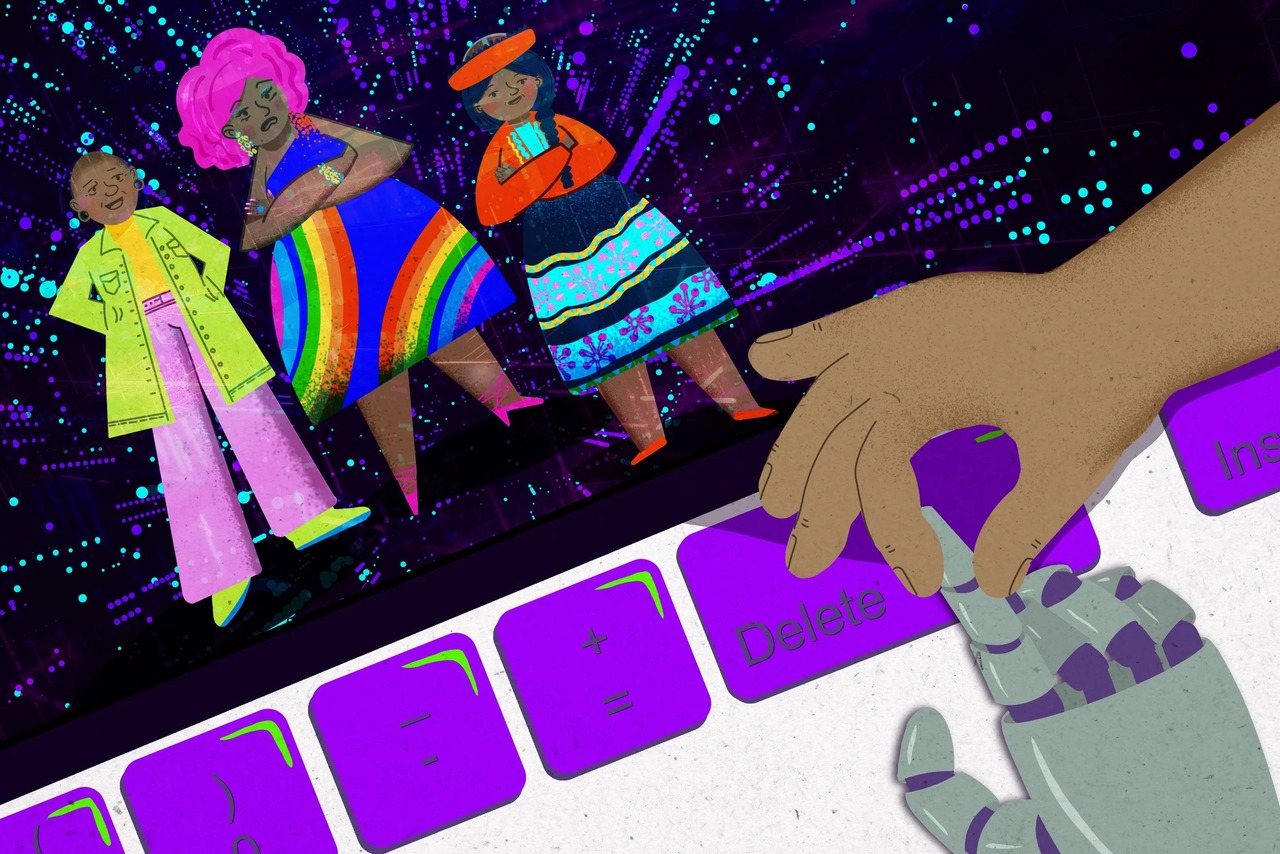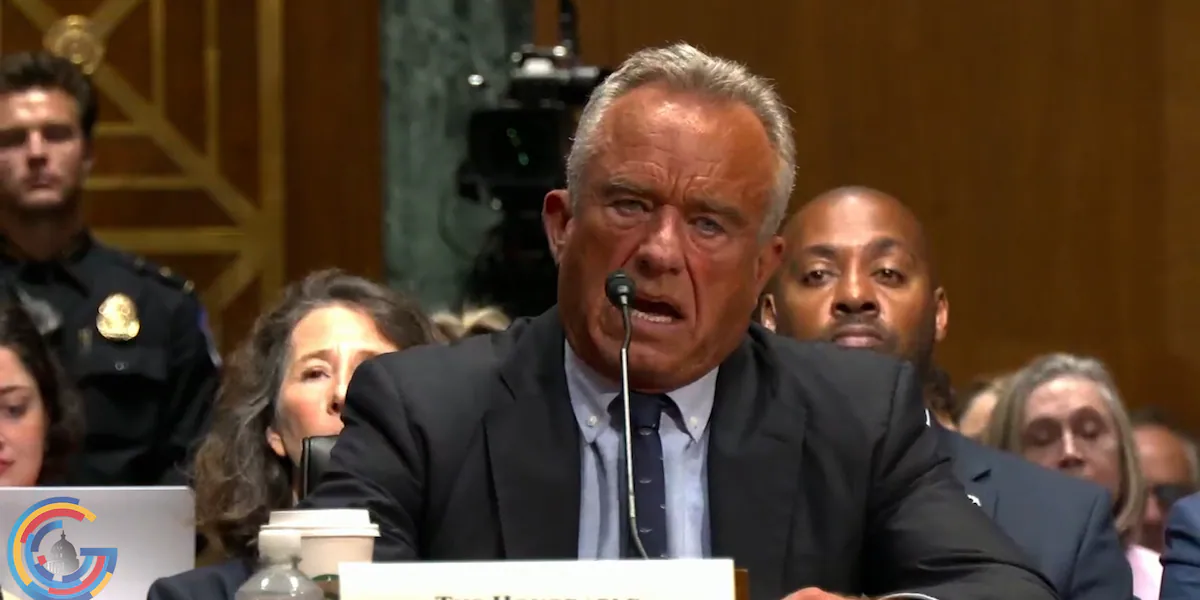
By Jimena Sandoval | Edited by Patricia Guadalupe
The battlefield of social justice has shifted. It no longer unfolds solely on city streets or in marches, courtrooms, or legislative chambers, but hums quietly, invisibly beneath our fingertips, embedded inside algorithms, encrypted messages, and platforms that shape how people live and how they’re seen. For trans, queer, Indigenous, migrants, Black, Latine, and marginalized communities, the fight for survival now includes a digital front.
At the forefront of this fight is Diego González-Medina, Founder of Liminal Works, a tech justice organization headquartered in West Hollywood, California, dedicated to building digital tools rooted in collective liberation and care. The name reflects the belief that technology and society are in a moment of transition, toward a community-led digital future. Raised with Chicano and Puerto Rican traditions and living openly with HIV, Diego says that he knows that survival in today’s world requires more than protest and understanding the stakes personally. “If technology is a weapon, then we need to forge our own armor,” he tells palabra.
Founded in July 2024 by leaders in civic, tech, nonprofit, and progressive movements, Liminal Works emerged from the rise of global tech surveillance and threats coming from the far right. In just six months, it transformed from a vision to action, launching programs in movements and security, movement-aligned infrastructure, and co-designing practical tools that equip grassroots leaders to defend and shape a more democratic future. More than half of its funding comes directly from community members, with additional financial and in-kind support from other individuals and from foundations. In its first year alone, over 25 volunteers across seven countries and six continents contributed more than 2,000 hours to building a safer, more resilient movement ecosystem. Today, Liminal Works is strategizing its next chapter, with plans to expand its reach and deepen global collaborations.
Diego’s journey into tech activism began in the wake of Donald Trump’s 2016 presidential win, when the digital threats became undeniable. Social media harassment, online doxxing, and algorithmic invisibility were common, and people Diego knew faced online harassment, censorship, and targeted violence.
In response, he founded House of Luna, a queer collective network that not only provides a sense of cultural belonging but also housing, digital resources, and leadership training to those rejected by society and excluded from mainstream systems. “I wasn’t looking for a substitute,” Diego tells palabra. “I was looking for a supplement I had been needing the whole time.”
The threats facing these communities have only intensified, something that Diego calls the “algorithmic rebranding of conversation therapy.” Platforms like YouTube, TikTok, and Facebook are now accused of incubating what advocates call “gender-critical and so-called ‘detransition’ narratives, bolstered by recommendation algorithms and disguising transphobia under pseudo-science.” Diego mentions what can be described as a chilling parallel: “The Ku Klux Klan changes shape over time to better hide itself. This is a long-standing pattern in oppressive movements.”
Algorithmic censorship is real. A 2023 University of Southern California study found that nearly 40% of factual data used by AI models contained bias, amplifying systematic inequalities rather than neutralizing them. “When someone posts about being transgender or Black and their reach drops for no clear reason, that’s not a glitch,” Diego says. “That’s how algorithmic suppression works in real time.” And the problem goes deeper than likes or views. Under the Trump administration, federal agencies banned entire categories of identity-affirming language, a move that went beyond bureaucracy and into ideological warfare. “Censorship isn’t just technical, it’s ideological,” Diego warns. “It’s about denying the very language we use to exist.” This silencing aims “to erase identities by denying the language that affirms them,” Diego adds, extending across social media and government systems alike.
In this hostile digital environment, cybersecurity is not a luxury; it is a necessity for survival. “We have always been the beta tester for oppressive technologies. Now, we’re becoming the architects of our own code,” Diego offers. This hands-on care evolved into Liminal Works, where Diego and his team now focus on building digital infrastructures that protect, rather than exploit, vulnerable communities. Their signature project, CECI, is a tactical communication network designed with gender justice organizations. But it’s not just another tech product, “it’s mutual aid in code form,” Diego mentions.
Through a co-design fellowship program, Liminal Works supports five community-designed tech projects this year, developed by and for those most impacted: trans people, undocumented folks, and unhoused organizers. “We give them funding and infrastructure directly, and provide fiscal sponsors like the Raft Foundation, which has supported them with licensing, open-source guidance,” Diego says. And Liminal Works doesn’t stop there. They’re planning to host “divestment clinics,” where community members ditch surveillance-heavy apps like Instagram, learn to use secure messaging tools like Signal, and discover alternatives, together. “We are going to fight Big Tech by ourselves, but we can walk away from it, together, and that’s powerful,” Diego shares.
These spaces turn resistance into ritual. “We don’t want to just replicate oppressive systems in new techs. We want to reimagine what security, access, and digital autonomy actually feel like, like dancing, like joy, like community,” Diego explains.
Diego calls it “math-laundering discrimination,” and he’s not alone in raising the alarm. “These systems weren’t built with us in mind. And when they built without us, they built against us,” says “L,” who is the head of compliance of a digital rights NGO. A digital rights advocate and technologist, L works closely with civil society organizations to monitor the ethical deployment of AI in public infrastructure. Due to the sensitive nature of their work and potential professional repercussions, L has requested anonymity. L has spent years watching global tech policy unfold without meaningful input from the very communities these systems impact. “These forums are expensive, technical, often in English only, and completely disconnected from lived experiences.”
The myth of “neutral” technology is particularly dangerous. Removing sensitive identity labels like “trans” or “Black” from datasets doesn’t eliminate bias, because algorithms can still infer identities through proxy variables. Instead, L advocates for returning data stewardship to the communities themselves, through stronger privacy laws, data collectives, and community-led audits. Amid this challenging landscape, Diego’s work and similar grassroots efforts offer a hopeful model. “With only a fraction of Big Tech’s budget, community-driven initiatives prioritize care, participation, and respect,” L observes, emphasizing that these communities’ voices must be included in the very forums that shape the rules governing our digital future.
For Liminal Works, security isn’t just passwords; it’s about culture, trust, and collective power. It’s about turning tech into something you can feel good using, not something that watches you or flags your existence as “sensitive content.”
For Diego, the solution lies in decentralization and social technology, tools built and governed by communities to meet their own needs. Social technology isn’t just about apps; it’s about principles like equity, participation, and sustainability. “Boycotts matter. They’re about choosing not to rely on platforms that harm us. But even more, we need alternatives that nourish us.”
The urgency couldn’t be clearer. Diego tells the story of a trans woman who was denied hormone therapy because a clinic system incorrectly flagged her as deceased. The error caused panic attacks and further delayed care.
Liminal Works shows that it’s possible to code from the margins, not to replicate, but to resist. Their projects are not only catching the attention of their communities, but they are also being noticed globally. The Resist Fund, co-founded by historians and activists, selected Liminal Works as one of only 20 groups it funds each year. Still, Diego stays grounded. “We are not trying to become a new tech giant. We’re trying to survive, and help our communities live with dignity.”
Liminal Works offers radically different paths forward. It’s one where communities don’t just fight back, they build alternatives.
“We’re not asking for permission to exist in these spaces,” Diego insists. “We are demanding the power to shape our digital future.” Their work isn’t a luxury; it’s an urgent upgrade to human rights infrastructure for the 21st century. The power comes from refusing invisibility; It’s about survival, but also creation, joy, and ownership. Because in a world that is made to delete a community, coding your existence is a revolutionary act. For Latine, BIPOC, and TGI (transgender, transsexual, gender-diverse, and intersex) communities, the future of digital life depends on autonomous infrastructures built from the ground up. “We are coding for our own survival,” Diego tells palabra.
As long as technology remains a war zone, it will be the builders of safe havens, people like Diego, who offer not just resistance, but hope.



